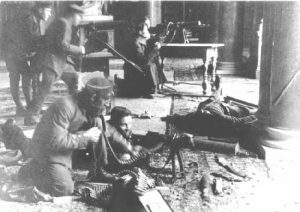Today Let’s Mobilize Directly for a Communist World

Soldiers and sailors rebel—Berlin, December 1918
German socialists who stuck to the line of workers’ revolution during World War I split from the pro-war Social Democrats (SPD) in 1916. In April, 1917, as communists fought socialists for leadership of the Russian Revolution, their German comrades formed the “Independent Social Democratic Party” (USPD).
By January 1918, the Bolsheviks (communists) were consolidating power in Russia. In Austria-Hungary, left-wing industrial workers led hundreds of thousands in political strikes demanding an unconditional end to the war. Social-democrat union leaders scrambled to help the capitalists restore order.
In Berlin, over a million – many led by USPD— went on strike against the war. Tens of thousands struck in over 50 other cities. In less than a year, the USPD reached 120,000 members.
The German emperor was losing control. In October he formed a liberal government, including SPD leaders. The imprisoned communist Karl Liebknecht called for the formation of workers’ and soldiers’ soviets (councils).
Five thousand workers marched with USPD in Berlin around the slogan: Overthrow the government! Navy sailors mutinied in Kiel. Forty thousand sailors, soldiers and workers formed themselves into soviets. Demonstrations and general strikes spread to other port cities.
The German revolution had begun.
Uprisings spread throughout Germany. More soviets formed. The Bavarian monarchy was overthrown. In Munich, a coalition of the SPD, the USPD and the Peasants’ League declared a republic.
In Berlin, too, a republic replaced the monarchy. The Social-Democrat Ebert became Chancellor. His SPD-USPD coalition government declared its intention of “implementing the socialist program.”
The German capitalists surrendered and ended the war. The socialist government called elections for January 19, 1919. It promised “immediate socialization measures.”
But the revolutionary upsurge continued. Political strikes started in Saxony and the industrial Ruhr. On December 23, an elite military unit that included radical Kiel sailors mutinied in Berlin.
Ebert had secretly allied with the imperial generals to “put down anarchy and Bolshevism.” Now they organized the anti-communist Freikorps, led by former officers. The Freikorps tried but failed to crush the rebellion.
USPD leaders resigned from Ebert’s government. More importantly, communists and left-wing socialists met on December 29-30 and formed the Communist Party of Germany (KPD).
Democracy or Revolution?
The SPD had already urged workers to attack the German Bolsheviks: “Socialism cannot be erected on bayonets and machine guns. If it is to last, it must be realised with democratic means…. Therefore we must draw a thick, visible dividing line between us and the Bolsheviks.”
The Spartacist Manifesto (1918) echoed this line. The question, it said, was “bourgeois democracy or socialist democracy. For the dictatorship of the proletariat … means using all instruments of political power to achieve socialism…”
The new KPD fought bitterly over whether to participate in the January elections or to fight for power in the streets. Rosa Luxemburg and others fought for elections and “socialist democracy.” But revolutionary communists won a resolution to prepare for armed insurrection.
Days later, the SPD government fired Police Chief Eichhorn, who had supported the mutinous troops in Berlin. An estimated 100,000 marched n protest.
A communist leaflet proclaimed: “The undersigned revolutionary committee, representing the revolutionary workers and soldiers, proclaims [the government’s] removal. The undersigned revolutionary committee assumes provisionally the functions of government.”
The Luxemburg group, in contrast, insisted on “avoid[ing] all slogans that might lead to the overthrow of the government at this point.”
But the “Spartacist Uprising” was underway. Workers and soldiers barricaded streets. However, they didn’t try to seize power. There is a big difference between mass political strikes and rebellions (on one hand) and revolution.
Again Ebert called in the Freikorps. This time, the workers’ rebellion was crushed. Luxemburg and Leibknecht were murdered.
The KPD boycotted the January 19 elections. Socialists got 45% of the vote, and Ebert became president of the Weimar Republic. The second national Congress of Workers’, Peasants’ and Soldiers’ Councils supported this bourgeois republic.
The struggle didn’t end there. A Bavarian Soviet Republic was proclaimed in Munich in April; it too was crushed by the Freikorps and the Army.
German communists opposed the Weimar Constitution, ratified in August. Like the US Constitution, it enshrined the “right of private property.” Its Article 48 allowed the president to suspend all civil rights in an “emergency.”
But by 1920, the KPD was running candidates in national elections. It merged with the USPD in 1922. The Communist International encouraged this electoral strategy.
The failure of the Spartacist uprising – the failure of the Bolshevik revolution to spread much beyond Russia – had weakened the communists’ confidence in the masses. Ebert and the socialists hadn’t crushed communism. They had co-opted it with bourgeois democracy.
Lessons of the German Revolution
Some say the uprising was a mistake. We disagree. The external conditions for communist revolution were there. The Russian Revolution was in progress. The German ruling class was in crisis. The masses were in motion. The KPD had a mass base—though, as it turned out, not massive enough. Too often, communist parties have held back at a critical moment – and lost their chance. But, having called for revolution, the KPD should have tried to lead a real fight for power.
Looking back a century later, we see that the KPD should have mobilized masses directly for communism – not only for “workers’ revolution.” Nobody back then saw that possibility. Russian “war communism” was a temporary emergency measure, not a mass mobilization to build communist society. It didn’t end the wage system.
A huge mistake the German communists made was retreating to an electoral political strategy.
When the 1905 Russian Revolution was crushed, communists regrouped and organize underground for revolution. In contrast, German communists in 1919 took the Weimar government’s bait and chose to become a legal party. And when Hitler invoked Article 48 in 1933, they weren’t prepared to defeat fascism with communist revolution.
Let’s not make that mistake ever again.
Front page of this issue

